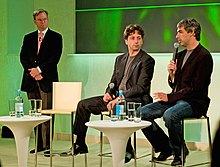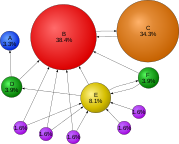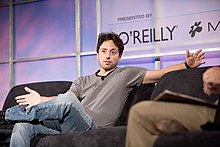
Lawrence Edward Page is an American businessman, computer scientist, and internet entrepreneur best known for co-founding Google with Sergey Brin.
Search engine optimization (SEO) is the process of improving the quality and quantity of website traffic to a website or a web page from search engines. SEO targets unpaid traffic rather than direct traffic or paid traffic. Unpaid traffic may originate from different kinds of searches, including image search, video search, academic search, news search, and industry-specific vertical search engines.
A backlink is a link from some other website to that web resource. A web resource may be a website, web page, or web directory.
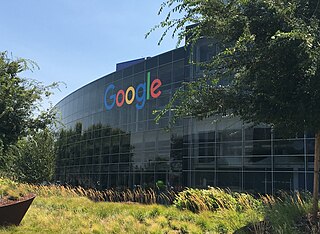
Google LLC is an American multinational corporation and technology company focusing on online advertising, search engine technology, cloud computing, computer software, quantum computing, e-commerce, consumer electronics, and artificial intelligence (AI). It has been referred to as "the most powerful company in the world" and is one of the world's most valuable brands due to its market dominance, data collection, and technological advantages in the field of AI. Google's parent company, Alphabet Inc. is one of the five Big Tech companies, alongside Amazon, Apple, Meta, and Microsoft.
David Ross Cheriton is a Canadian computer scientist, businessman, philanthropist, and venture capitalist. He is a computer science professor at Stanford University, where he founded and leads the Distributed Systems Group.
The Innovators Under 35 is a peer-reviewed annual award and listicle published by MIT Technology Review magazine, naming the world's top 35 innovators under the age of 35.
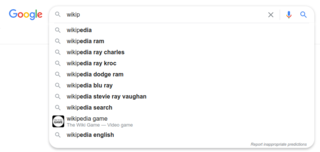
A search engine is a software system that provides hyperlinks to web pages and other relevant information on the Web in response to a user's query. The user inputs a query within a web browser or a mobile app, and the search results are often a list of hyperlinks, accompanied by textual summaries and images. Users also have the option of limiting the search to a specific type of results, such as images, videos, or news.
Google was officially launched in 1998 by Larry Page and Sergey Brin to market Google Search, which has become the most used web-based search engine. Larry Page and Sergey Brin, students at Stanford University in California, developed a search algorithm first (1996) known as "BackRub", with the help of Scott Hassan and Alan Steremberg. The search engine soon proved successful and the expanding company moved several times, finally settling at Mountain View in 2003. This marked a phase of rapid growth, with the company making its initial public offering in 2004 and quickly becoming one of the world's largest media companies. The company launched Google News in 2002, Gmail in 2004, Google Maps in 2005, Google Chrome in 2008, and the social network known as Google+ in 2011, in addition to many other products. In 2015, Google became the main subsidiary of the holding company Alphabet Inc.

Héctor García-Molina was a Mexican-American computer scientist and Professor in the Departments of Computer Science and Electrical Engineering at Stanford University. He was the advisor to Google co-founder Sergey Brin from 1993 to 1997 when Brin was a computer science student at Stanford.

Massimo Marchiori is an Italian mathematician and computer scientist.

Anne E. Wojcicki is an American entrepreneur who co-founded and is CEO of the personal genomics company 23andMe. She founded the company in 2006 with Linda Avey and Paul Cusenza. She is a co-founder and board member of the Breakthrough Prize.
Kaltix Corporation was a personalized search engine company founded at Stanford University in June 2003 by Sepandar Kamvar, Taher Haveliwala and Glen Jeh. It was acquired by Google on September 2003.
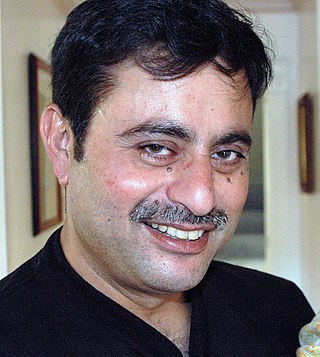
Rajeev Motwani was an Indian American professor of Computer Science at Stanford University whose research focused on theoretical computer science. He was a special advisor to Sequoia Capital. He was a winner of the Gödel Prize in 2001.
The Stanford Digital Library Project (SDLP) was a research program run by Hector Garcia-Molina, Terry Winograd, Dan Boneh, and Andreas Paepcke at Stanford University in the mid-1990s to 2004. The team also included librarians Rebecca Wesley and Vicky Reich. The primary goal of the SDLP project was to "provide an infrastructure that affords interoperability among heterogeneous, and autonomous digital library services." and described elsewhere as "to develop the enabling technologies for a single, integrated and "universal" library, proving uniform access to the large number of emerging networked information sources and collections."

Googlization is a neologism that describes the expansion of Google's search technologies and aesthetics into more markets, web applications, and contexts, including traditional institutions such as the library. The rapid rise of search media, particularly Google, is part of new media history and draws attention to issues of access and to relationships between commercial interests and media.

PageRank (PR) is an algorithm used by Google Search to rank web pages in their search engine results. It is named after both the term "web page" and co-founder Larry Page. PageRank is a way of measuring the importance of website pages. According to Google:
PageRank works by counting the number and quality of links to a page to determine a rough estimate of how important the website is. The underlying assumption is that more important websites are likely to receive more links from other websites.

Susan Diane Wojcicki is an American business executive who was the chief executive officer (CEO) of YouTube from 2014 to 2023. Her net worth was estimated at $765 million in 2022.
Rajen Sheth is an executive at Google, where he currently runs product management at cloud AI and machine learning team. The idea of an enterprise version Google's email service Gmail was pitched by Rajen in a meeting with CEO Eric Schmidt in 2004. Schmidt initially rejected the proposal, arguing that the division should focus on web search, but the suggestion was later accepted. Sheth is known as "father of Google Apps", and is responsible for development of Chrome and ChromeOS for Business.
Stanley George Wojcicki was a Polish American physicist and former chair of the physics department at Stanford University in California.
The Breakthrough Prize in Life Sciences is a scientific award, funded by internet entrepreneurs Mark Zuckerberg and Priscilla Chan of Facebook; Sergey Brin of Google; entrepreneur and venture capitalist Yuri Milner; and Anne Wojcicki, one of the founders of the genetics company 23andMe.

